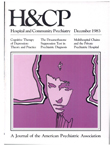Legal Coercion and Retention in Drug Abuse Treatment
Abstract
The criminal justice system is increasingly referring offenders who have mental health problems to the community mental health system for treatment. The effects of such referrals on treatment outcome and on the mental health and criminal justice systems are not well understood. Because the length of time an individual remains in a drug abuse treatment program is an important indicator of treatment effectiveness, this paper assesses the impact of court referrals by examining the relationship between a drug abuser's length of stay in treatment and his referral by legal and nonlegal sources. Regression analyses on data for more than 2,200 individuals indicate that clients who are legally induced to seek treatment stay in treatment longer than, and do at least as well as, those who seek treatment voluntarily. The implications of these findings for drug abuse treatment and policy are discussed.
Access content
To read the fulltext, please use one of the options below to sign in or purchase access.- Personal login
- Institutional Login
- Sign in via OpenAthens
- Register for access
-
Please login/register if you wish to pair your device and check access availability.
Not a subscriber?
PsychiatryOnline subscription options offer access to the DSM-5 library, books, journals, CME, and patient resources. This all-in-one virtual library provides psychiatrists and mental health professionals with key resources for diagnosis, treatment, research, and professional development.
Need more help? PsychiatryOnline Customer Service may be reached by emailing [email protected] or by calling 800-368-5777 (in the U.S.) or 703-907-7322 (outside the U.S.).



